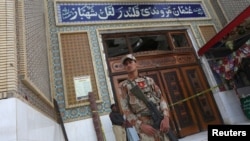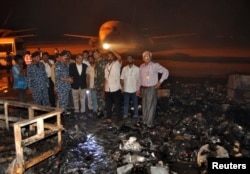Pakistan has a plan to curb extremism and violence in a key terror-wracked province: add 10,000 police officers, flood the region with security cameras, and enhance protection of a major economic project with China.
But analysts and activists question whether boosting security spending in Pakistan's Sindh province by 10 percent in the new fiscal year will significantly deter terrorism and crime, particularly in Karachi, a city of 27 million people.
"We don't just need a plan but execution of the plan," said Jameel Yusuf, a citizen crime fighter and founder of Citizens Police Liaison Committee, a self-funded nonpolitical organization which gathers data on crime and extremism-related activities in Karachi. "We need huge changes in the current law-and-order system. We need massive funding, mapping, modern investigative and management tools and an up-to-date intelligence network to counter crime and extremism in Karachi."
Sprawling Karachi has several pockets which serve as territories to organized criminal gangs and armed political parties where police hesitate to enter. The city is also home to various terror and militant groups.
"In these trying times. Law and order remains at the forefront of our efforts to create a nation that is safe for all its citizens regardless of caste, creed and religious affiliation," Sindh Chief Minister Murad Ali Shah said in his recent budget speech, as quoted by the Dawn newspaper. "Strengthening our law enforcement agencies through training and equipment is at the forefront of our fight against terrorism."
In addition to adding police to ease the world's worst police-to-population ratio in Karachi, the provincial government plans to install security cameras in major cities and create 3,000 security posts to protect parts of the China-Pakistan Economic Corridor, a multi-million-dollar project designed to create jobs and facilitate trade.
Past attacks
Karachi has been a victim of several terrorist attacks in recent years.
In June 2014, 36 people died when Karachi's International airport was stormed by Tehreek-i-Taliban Pakistan militants. In May 2015, gunmen sprayed bullets on a bus carrying Ismaili Shia Muslims, a minority sect, killing 46; Islamic State claimed responsibility. Security agencies recently arrested five Islamic State operatives who they say were planning to carry out terrorist attacks there.
Pakistani media say there's been a significant decrease in terrorism-related activities in the city over the past two years, but analysts fear more attacks are possible if security isn't bolstered. Security experts say Karachi has the worst police-to-citizen ratio in the world: one police officer for every 950 residents, when it ideally should be one for every 275 people.
"Karachi needs more police presence. It is a demographic pressure cooker," Huma Baqai, a political analyst, told VOA.
According to the Citizens-Police Liaison Committee, some 60,000 citizens were mugged in 2016.
Adnan Abro, a resident of Lyari, one of the oldest and most densely populated areas of Karachi, says his perception is that crime is increasing.
"They [gangsters] come and kill us or snatch our belongings in broad daylight, and there's no one to stop this or to protect us," Abro said.
Allocation of resources
Sindh, Pakistan's third-largest province, has allocated nearly $893 million to strengthen its security agencies in fiscal year 2017-18, which includes adding 10,000 posts of different ranks to the provincial police force.
The total also includes nearly $19 million to equip law enforcement agencies with hi-tech security equipment, $1.9 million to install security cameras, $25 million to build a state-of-the-art forensic laboratory, and $2.69 million to build an intelligence school and data center to help police solve complex crimes.
Ahmed Khan, a longtime resident, is hopeful that increased security will help to fight lawlessness.
"The raise in security budget is laudable and will help Karachi to overcome street crime, which has swarmed the city for decades now," Khan said. "People lose their lives for a mere mobile phone. We can only hope the government will make sure to keep up their promises."
Analysts say the anti-terror proposals are "highly optimistic," but warn that the government should take many other factors into consideration as well.
"Smart political footwork, vigilance and accountability is needed at the topmost level to resolve government," analyst Baqai said.







